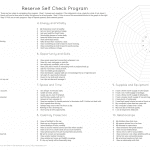This article shares insights on five essential questions for every leader. Inman News published the article by Chris Pollinger.
Every leader needs to ask themselves five essential questions in order to grow. The next few years are shaping up to be banner years for the real estate industry.
A significant demographic push, current economic policy and post pandemic rebound should drive both transaction counts and higher prices. What are you going to do to take advantage of it? Where will you create value for others which translates into profit for you and your team? Here are the five essential questions for every leader you need to be asking yourself.
What makes us different?
You need a mission. Something compelling which drives your team. At the end of the day, your team sells houses. It’s how you do sell them. Or better, the experience the client has during the process that makes your team different.
Collectively, we are failing at this as an industry. It is hard for the customer to tell the difference between one agent and another. The bar for service has become incredibly low. As an illustration, we have a growing group of customers who are willing to pay more to an iBuyer than to have to deal with an agent and the traditional sale process.
I started using the “mom” test when referring out real estate business decades ago. Meaning would I trust that person with my mom’s real estate needs? We are nearing two million NAR members. How many of them would pass that test? Maybe 5%, or 100,000 agents.
In today’s world, the expectations have become higher. Yes, I still need to be able to trust your competency. But now, how the client feels about the experience is equally important. If communication is one of your differentiators, then make it a point to over communicate. Explain each part of the process. Keep the client in the loop each day with either a call, text or email. Even if there isn’t anything new to say. You get points for the call saying “There isn’t anything new to update you on but I wanted to check in, keep you informed, and see if you had any questions that popped up in last 24 hours.” Whatever it is that makes you different, become obsessive about it.
What do we really sell?
Beyond the end user, why should agents align themselves with you? I get called in to help improve organizations recruiting numbers on the regular. It’s amazing how many times I ask to hear their pitch and I get a blank stare. If you as the leader can’t communicate your unique value proposition, then how are you expecting any of your staff too? If you can’t honestly look someone in the eyes and tell them they will do more business, in less time and keep more at the end of the day with you, then you shouldn’t be talking to them.
HOW you help them make more money and have a better quality of life is what you sell. WHY you do it that way is your story. Your competitors have a similar tech stack. They have brands. At the end of the day, they sell houses like you do. How you do it is where your unique value proposition lies.
As an example, Some organizations have nailed marketing. If that’s the case, then highlight how your proprietary marketing system helps agents sell houses for X% higher than the average and Y% faster than the competition.
Whatever it may be, define it. Name it so you can brand it to your organization. Then sell the hell out of it.
What does our client value?
The only people who can answer this are customers themselves. Leadership should always seek the answers from them directly. Your opinion is secondary. Their perception is paramount.
Too many times leaders get stuck in one-directional thinking. Life is not a monolog. Don’t get caught up in your ego. Learn to listen. Start with purposing to seek to understand the other person. On important points, repeat things back in your own words to make sure you have it right. Not only does this help you define their viewpoint, but it also lets them know you are listening. If things aren’t clear, ask questions to help clarify the issues. Many times, the real issue is buried under a small hill of distractions and over generalizations.
Remember, the customer is one who must be satisfied to achieve results. They are the only one who gets to vote in whether they are happy with your performance or not.
How do we define and measure success?
Progress and achieving results can be measured both qualitatively and quantitatively. Both types of measurements are necessary and must be balanced.
There are plenty of distractions out there. My advice? Focus on volume. It’s what dictates the top line of your profit and loss. There are plenty of key performance indicators which influence that number. For your organization, your dashboard should focus on the leading indicators and factors which drive volume. New listings each month, average Per-Person-Productivity and how many associates you have actively participating in ratified contracts each month provide you with a good start. For trailing indicators, like volume or profit, you can update these numbers weekly or monthly. For leading indicators, new listings and productive agent count, should be tracked daily.
What is our plan?
What actionable programs or systems do you have in place which will affect the next 12 months? How much of your associates time is spent in dollar productive activity? What systems can you put into place to free up time? Where is your highest return on investment? As the leader, where are you investing your time?
Organizations tend to fall into one of two camps. The first camp reads a book on how fortune 100 companies plan. Then tend to overthink the process. You don’t need a 200-page business plan to run a billion-dollar real estate business. The second camp, underwhelm the effort. That same billion-dollar real estate business needs more than a single page if they want to see any substantial growth.
The keys to profit start with defining what differentiates you from your competitors and what you actually sell. It then moves into viscerally understanding what your clients really value. Then you can set your goals and put together an actionable plan to achieve them. With the significant opportunities on horizon for real estate, now it is as important as ever to ask yourself the five essential questions for every leader above.
Chris Pollinger, Founder and Managing Partner of RE Luxe Leaders, is the profit whisper to the leadership elite in the business of luxury real estate. He a senior sales and operational executive skilled in strategic leadership, driving profit, business planning, sales, marketing, acquisitions, operations, recruiting, and culture building. You can contact him for a free consult today.





